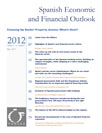Cleaning Up Banks’ Property Assets: What’s Next?
Fecha: 2012
Spanish and International Economic & Financial Outlook, SEFO, V. 1 N.º 1
Sumario
[expand title= "Highlights of Spain’s new financial sector reform "]- Spain has just approved its second financial reform this year, containing complementary measures to those approved last February, with an aim to clean-up banks’ balance sheets. The reform also incorporates the creation of so-called asset management companies (SGAs in their Spanish initials) that will serve as the instruments through which troubled real estate assets of banks will first be transferred, and subsequently sold, over the next few years. This note summarizes the main elements of the new reform and makes a preliminary assessment of its potential impact.
- Leer más
- The Spanish economy and in particular the banking sector have undergone an intense period of transformation driven by European integration, economic boom, and the financial crisis itself. This article analyses one of the key aspects of this transformation process - the specialisation of the Spanish banking system - over the past decade and within a European context. We conclude that, while originally an important strength of the Spanish banking model, the specialisation of the originate-to-hold, retail banking business into the property market, together with overexpansion of installed capacity, are some of the imbalances that need to be corrected to ensure the health of the sector. This is particularly important at a time when access to wholesale finance remains restricted and a period of significant economic slowdown and deleveraging lies ahead. Going forward, in parallel to the on-going restructuring efforts, the banking sector must also expand services, reorient business towards more productive sectors, increase its share of non-interest income, and importantly, internationalize.
- Leer más
- While a significant degree of public attention on Spanish imbalances has been devoted to the public debt, Spain does not seem to have a comparative disadvantage relative to its European peers where public debt levels are concerned. However, Spanish private sector debt experienced intense growth in the years prior to the crisis and is now considerably higher than the EU average. This article shows that Spain’s private debt imbalances are significant and correcting them is one of the major challenges for the Spanish economy over the next few years. Private debt has been mainly channelled through banks. As a consequence, current banks’ asset impairment problems - and the resolution mechanisms necessary to address them - will determine to a large extent the way the deleveraging process is conducted. Furthermore, private sector debt imbalances and related banking problems are linked to house price dynamics. Lower house prices and improved housing affordability could be two of the means through which to help Spain to accelerate private sector deleveraging.
- Leer más
- Acute credit restrictions and international investors’ growing mistrust of Spanish risk is making it nearly impossible for the regions to meet their financing needs based on traditional fund raising models. In response to these concerns, this article analyses the state of regional debt markets in 2011 and the need for alternative solutions. Consideration is given to a range of options for greater Treasury intervention, including the hispabonos debate, or the creation of a specialized vehicle for regional and local government funding to improve the regions’ ability to finance themselves and meet debt service and other budgetary obligations.
- Leer más
- The crisis that began in the summer of 2007 marked a turning point in the stock of Spanish government debt held by non-residents, which had increased in absolute and relative terms since the middle of the 1990’s. This phenomenon has been common for most economies of the periphery of the euro, and its coincidence with episodes of sharp widening of sovereign spreads vs. Germany shows that non-resident investors now perceive a higher credit risk in some member states’ government debt than in the past.
- Leer más
- In order to comply with ambitious deficit targets agreed upon with Brussels over the medium term, together with the introduction of proactive legislative structural reforms, during its first 100 days in office, the Spanish administration adopted a series of fiscal consolidation measures. Revenue enhancing measures include urgent tax increases affecting the personal income tax, property tax, and revenues from telecommunication services, as well as tax measures included in the 2012 budget related to the corporate tax, shadow income, tobacco tax, and court fees. Nevertheless, the negative impact on revenues from the economic downturn and taxpayers’ reactions to proposed tax reforms must be taken into account. Expenditure reduction measures, also contemplated both urgent measures as well as an austere 2012 budget. Cost cutting measures introduced include cuts in the area of personnel expenditures, and cost control measures in the budget, such as the establishment of an expenditure ceiling, as well as generalized cuts across the different levels of the public administration.
- Leer más

